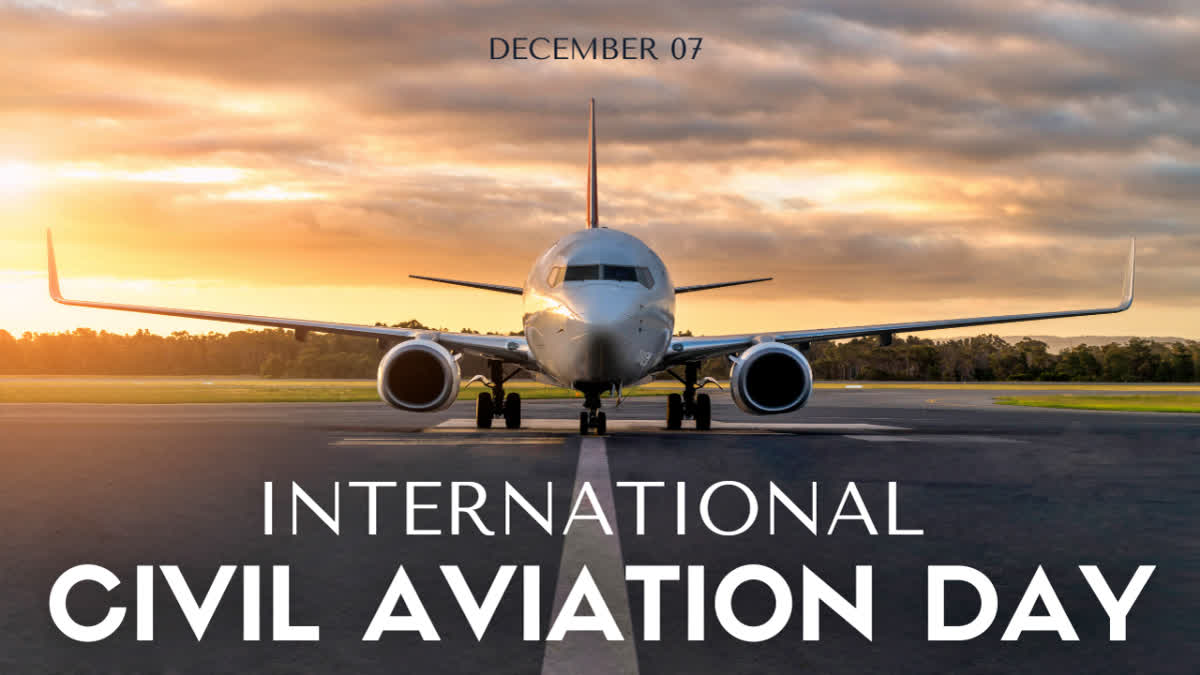Hyderabad: International Civil Aviation Day is observed on December 7, which sheds light on the pivotal role of the International Civil Aviation Organization (ICAO) in global air transport. This day serves to raise awareness globally about the crucial impact of international civil aviation on the social and economic development of nations, emphasising the ICAO's unique role in developing global cooperation and establishing a transit network for the benefit of humanity.
Since its inaugural celebration in 1994, International Civil Aviation Day has been observed as a global event. The ICAO, a UN body, plays a vital role in setting international standards for aviation safety.
The theme for 2023, as decided by the Council, is "Advancing Innovation for Global Aviation Development." This aligns with the broader global agenda outlined in Agenda 2030, emphasising sustainable development across nations.
Why is International Civil Aviation Day celebrated?
According to the United Nations, the purpose of International Civil Aviation Day is to emphasise the importance of international civil aviation organizations in air traffic around the world. The international UN agency overseeing all this activity is the ICAO, which is also responsible for enforcing international civil aviation safety standards. As we celebrate International Civil Aviation Day, it is fitting to highlight the ongoing efforts to connect the world to recover and revitalise the industry amid the ongoing coronavirus (Covid-19) pandemic.
Importance of civil aviation and the ICAO-
Civil aviation, along with the International Civil Aviation Organization (ICAO), holds significant importance for various reasons.
Economic benefits-
The aviation industry is a major contributor to economic activity, generating employment in areas like airlines, airports, and air navigation services. This encompasses roles in check-in, baggage handling, retail, cargo, and catering. Additionally, aviation fosters job opportunities in manufacturing, with companies producing aircraft, engines, and essential technologies. Indirectly, suppliers to the aviation sector, such as fuel providers and construction firms, contribute to economic growth. According to the UN, aviation's impact on the global economy is comparable to the entire GDP of the United Kingdom.
Social benefits-
Aviation serves as a catalyst for positive social change by connecting nations and people, irrespective of their location. It facilitates access to essential needs like improved livelihoods, food, healthcare, education, and safe communities. Whether responding to crises, providing humanitarian aid, or enabling leisure activities, aviation plays a crucial role in promoting social causes globally. For vulnerable groups, migrants, and those in remote areas, air transport serves as a lifeline, enhancing social inclusion and connectivity.
What is ICAO?
Established on December 7, 1944, the International Civil Aviation Organization (ICAO) was founded to develop international collaboration and uniformity in matters pertaining to civil aviation. Concurrently, the International Services Transit Agreement and the International Air Transport Agreement were also ratified in that pivotal year. Marking its 50th anniversary in 1994, ICAO initiated the International Civil Aviation Day, a commemoration designed to raise global awareness about the pivotal role of international civil aviation in the socio-economic development of nations.
Operating as a specialised agency of the United Nations (UN), ICAO collaborates with other UN bodies such as the World Meteorological Organization, the International Telecommunication Union, the Universal Postal Union, the World Health Organization, and the International Maritime Organization. Its objective is to ensure safe and efficient air travel on a global scale.
The emblematic ICAO logo features a pair of aircraft wings overlaid on the UN logo, which comprises a world map encircling the North Pole, surrounded by a wreath with crossed stylized branches of the olive tree symbolising peace. The map, projecting to 60 degrees south latitude and enclosed by five concentric circles, signifies the UN's focus on peace and security.
75 years of ICAO
In a nod to linguistic diversity and inclusivity, ICAO introduced Arabic and Chinese as its official working languages in 1995, a move reflected in the organization's logo. Celebrating 75 years of existence, ICAO stands as a linchpin in the International Civil Aviation network, facilitating the transport of over four billion passengers annually.
The global Air Transport sector, bolstered by ICAO's efforts, sustains a staggering 65.5 million jobs and contributes USD 2.7 trillion to global economic activity. A testament to its impact, more than 10 million individuals labor in the aviation industry to ensure the safe passage of 120,000 flights and 12 million passengers daily. Research by the Air Transport Action Group mentioned the broader ramifications, revealing that at least 65.5 million jobs and 3.6 percent of global economic activity are tied to the aviation industry, encompassing the wider supply chain and tourism-related jobs enabled by air transport.



